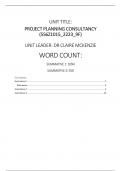Essay
Business Project Consultancy - Full report - Grade: First - First Semester
- Institution
- Manchester Metropolitan University (MMU)
Project Planning Consultancy (First Semester) submission graded 74%. 14 pages total with summative 1,2 & 3. Contains everything besides video presentation, including proper layout, reports, and images necessary for a first-class grade.
[Show more]



